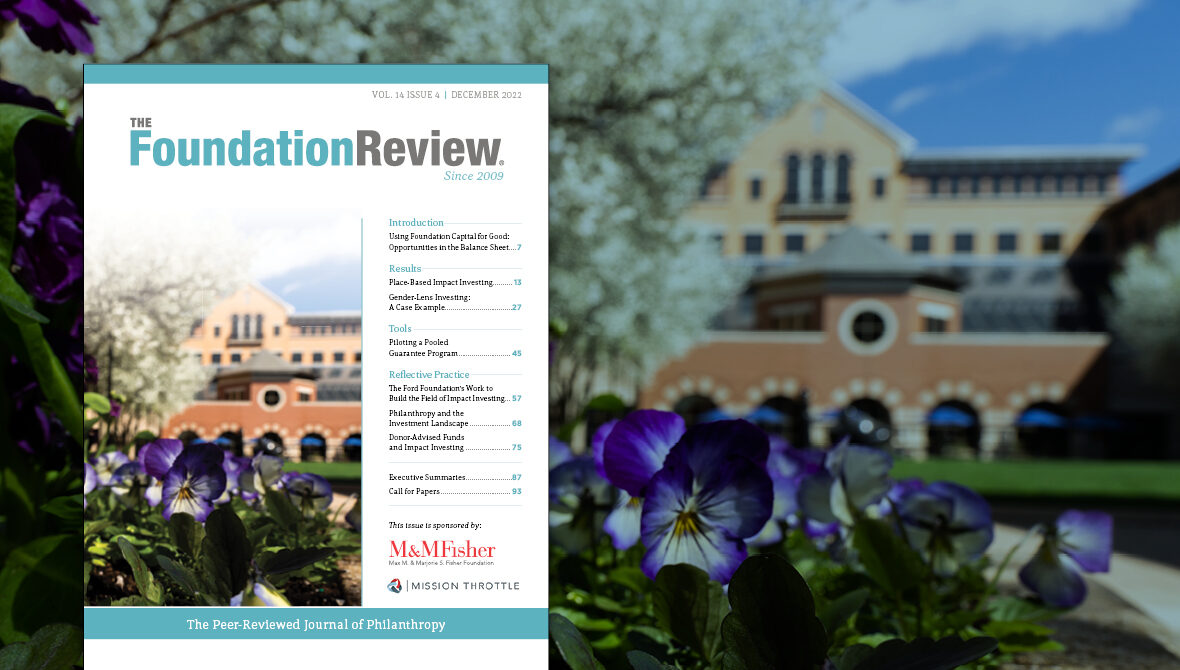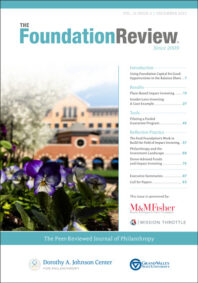Impact Investing: Lessons Learned from Practitioners and Advocates


 Foundations occupy a unique role in the financial and nonprofit marketplaces. They generally seek to preserve if not grow their corpus and advance their public charity mission; they invest in the market for financial returns and in nonprofits for social return.
Foundations occupy a unique role in the financial and nonprofit marketplaces. They generally seek to preserve if not grow their corpus and advance their public charity mission; they invest in the market for financial returns and in nonprofits for social return.
More and more, these functions are finding common ground through using a foundation’s investment portfolio to further the charitable mission of the foundation while still achieving a financial return. The uptake has been inconsistent, yet the lessons learned from those who have done so offer much for the field and the larger financial marketplace, especially in terms of advancing, measuring, and managing social impacts. This issue of The Foundation Review represents a step toward sharing those lessons with the field.
There are many individuals and organizations working as practitioners and advocates for impact investing. We hope this issue contributes to developing the knowledge base needed to support practice.
Thanks to the sponsorship of the Max M. & Marjorie S. Fisher Foundation and Mission Throttle, this issue is free for anyone to download and explore!
Sherman and Olazabal provide an introduction and overview of the “why” and “so what” of impact investing. Investing in nonprofit and for-profit companies that offer clear social and financial returns, investing their corpus in companies whose products and services align with their missions, using social bonds to inject new resources into their programs, offering guarantees to help grantees manage risk, and avoiding companies whose practices run counter to their grantees’ efforts — exemplify the innovative full balance sheet approaches taken by some foundations. This paper describes the context in which these efforts are occurring and provides the landscape of actors and leaders. It concludes with key opportunities and challenges for philanthropic foundations and all investors wanting to ensure a sustainable planet and the wellbeing of all people.
In this article, Kerman and Miller share a recent evaluation of the Western New York Impact Investment Fund. This place-based fund, born of a collaboration between regional and national philanthropies, catalyzed a broader partnership with private individual and corporate investors. Five years into a diverse portfolio, the fund has achieved a variety of social impact and financial results, including living wage jobs, reduced carbon footprints, and financial returns for investors.
Impact investing may be highly targeted for specific populations. Bolinson and Allan argue that foundations can play two critical roles in the impact investing ecosystem: to commission and/or support research that helps build more equitable and socially just impact investing and to fund grantee-specific experimentation in areas of developing impact investing. This article presents action research conducted on gender-lens investing, describing a 2019 Mastercard Foundation grant to Engineers Without Borders Canada. The results for both the project and for the field are detailed.
A guarantee instrument is a credit enhancement tool that can enable philanthropies to unlock dollars for societal impact. Reisman, Baek, Newsome, and Ryan describe the Community Investment Guarantee Pool, created in 2019 by a collaboration of philanthropies and allied impact investors, and share early challenges and insights related to the underlying theory of change. This article discusses investor “but for” contributions; treatment of risk (perceived versus actual), both for the guarantors and intermediary recipients; and adaptations for specific markets.
Brandenburg and Iqbal share the role the Ford Foundation has played in seeking to grow the field of impact investing. This support has enabled the development of the metrics, engagement, policies, and norms needed to underpin capital markets at scale. Ford has chosen to augment its Program-Related Investments and Mission-Related Investments portfolios with a dedicated field-building initiative that can grow the field, and its impacts, in the timeframe required to make progress against the Sustainable Development Goals.
In this article, Ligonde, De Temple, and Ajuyah argue that the long-term pursuit of values-based goals and financial performance are mutually inclusive and self-reinforcing and can be combined to great effect with more traditional forms of philanthropy (i.e., grantmaking). Further, they argue impact investing provides the opportunity for the engagement of additional stakeholders and members of the community.
Any discussion of foundations embracing impact investing must include some discussion of one of the largest — and growing — sources of philanthropic capital: donor-advised funds. Marks reflects on the unique challenges sponsors of these funds face in catalyzing impact investments. Like the larger institutional foundations that have led the way as mission investors, sponsors must often educate and inspire governance boards and investment committees. Unlike foundations with professional program staff, decisions regarding philanthropic resources at sponsors of donor-advised funds are guided by multiple account holders, often numbering in the hundreds or thousands. This article takes a practitioner’s view on the issue, reflecting on lessons learned by a sponsor of donor-advised funds that has long accommodated the impact investing interests of its donors.